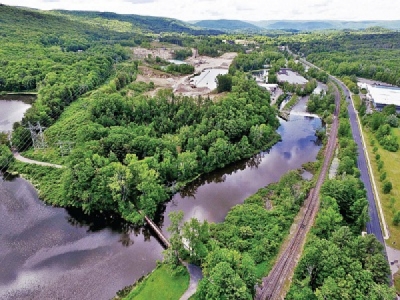
Posted on June 13, 2017
By Larry Parnass, The Berkshire Eagle
On cable news channels, clocks are ticking down to a momentous event Thursday in Washington, D.C.
But for many in the Berkshires, the news that hits closest to home will be made not on Capitol Hill by former FBI Director James Comey, but down the Mall at the William Jefferson Clinton East Building.
There, in Room 1152, a decades-long debate over General Electric Co.’s responsibility for PCB pollution in the Housatonic River will be explored by three judges sitting on the Environmental Appeals Board.
For four hours, attorneys representing GE, the states of Massachusetts and Connecticut, the Environmental Protection Agency and other parties will spar over differences related to the $613 million, 13-year cleanup the EPA imposed last fall on GE.
This “Rest of River” action focuses on removing cancer-causing PCBs from areas downstream of Fred Garner Park in Pittsfield and through the towns of Lenox, Lee, Stockbridge and other communities to the south. The substance polychlorinated biphenyl was released into the river as part of GE’s transformer manufacturing business, until PCB hazards were recognized and its use banned in 1977.
Kathie A. Stein, one of the judges hearing the appeal, notes that the board had to schedule both morning and afternoon sessions “given the complexity of the matter and the large number of appeals, parties and issues.”
The session comes amid word of a policy turnaround within the EPA.
Last week, Timothy M. Conway, a senior EPA attorney in Boston, notified parties to the dispute that the agency wanted to work outside of the appeals process to settle the case with GE. That announcement caught Berkshires environmentalists by surprise. At least two parties were able within hours to file objections to it.
In a memo, Conway linked the abrupt shift to a new message from Washington.
The EPA’s new administrator, Scott Pruitt, wrote in a May 22 directive that he would take personal charge of cleanups costing $50 million or more.
But Conway’s request for a 90-day delay in the appeals process came too late to affect plans for the oral arguments scheduled Thursday.
Rather than seek to pre-empt the proceeding, Conway will appear like any other attorney at the session.
“Mr. Conway intends to respond to the issues presented by the board,” said Nancy Grantham, a spokeswoman for the EPA headquarters office.
Nonetheless, given the circumstances, Conway will be free in the course of his responses to be guided by signals coming down from Pruitt.
In his memo last week, Conway wrote, “EPA proposes to move for a 90-day stay in the five In Re General Electric Company actions … and, further, to hold oral argument in abeyance pending completion of settlement discussions. The EPA Administrator has expressed a strong policy interest in expediting and finalizing resolution at Superfund cleanups.”
It continued, “Although the case has been fully briefed, EPA has determined that a stay of the proceedings at this time is appropriate and necessary to reopen mediation discussions with interested parties to ascertain if a comprehensive settlement of the pending appeals can be reached.”
Conway’s memo signaled that on policy matters, the ground was shifting under the cleanup order that GE had appealed. A company spokesman said it stood ready to participate in Thursday’s oral arguments, but was also ready to talk.
“GE welcomes the opportunity to try to find a common-sense solution,” said spokesman Jeff Caywood.
The appeals board, while part of the EPA, operates independently of the agency’s administrator. The board’s decisions can be appealed to the D.C. circuit of the federal courts.
Day’s proceeding
When oral arguments begin at 10 a.m., the board will first explore whether the EPA’s order is inconsistent with the consent decree reached by the parties in October 2000.
Next up is discussion of the cost of the EPA’s cleanup order. The board says it wants lawyers to be prepared to talk about examples from federal judicial rulings or EPA decisions “illustrating how much weight was given to the cost differentials of remedial alternatives.”
Judges are then expected to quiz attorneys on the “implementability” of the order.
Last up before a lunch break is a look at how the views of the state and immediate river community can and should influence the types of cleanups ordered.
The afternoon session will focus on the extent of the EPA’s order — namely, whether it goes too far, or doesn’t go far enough. The final topic is where to dispose of PCB-laden soil and sediments dredged from the river area.
GE is opposing a requirement that the materials be sent out of state, saying that will add $160 million to $245 million to the cleanup cost.
On each of the issues pinpointed by Stein, acting for the appeals board, lawyers will have limited time to speak.
In all, the EPA is allotted the most response time, 86 minutes, followed by GE, which gets 65 minutes over the course of the day.
Other parties, some of them addressing fewer issues, have less time, from the five minutes given Richard M. Dohoney, Pittsfield’s counsel, to five minutes for Green Berkshires, 12 minutes for the state of Connecticut, 22 minutes for Massachusetts, 25 minutes for the Housatonic Rest of River group (representing river towns to the south of Pittsfield), and 35 minutes for the Housatonic River Initiative.
In a filing, Stein notes that while the proceedings identify areas of interest to the judges, the list of subjects does not indicate “that the board has made any determinations in these cases.”
The board does not provide a timeframe for its decisions.
Source: The Berkshire Eagle





